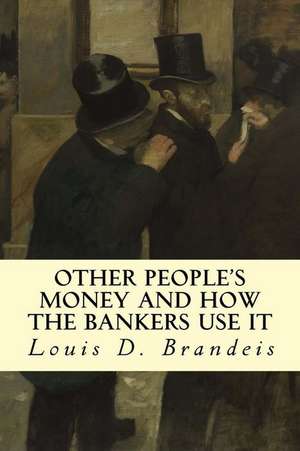Other People's Money and How the Bankers Use It
Autor Louis D. Brandeisen Limba Engleză Paperback
| Toate formatele și edițiile | Preț | Express |
|---|---|---|
| Paperback (4) | 45.09 lei 3-5 săpt. | |
| CreateSpace Independent Publishing Platform – | 45.09 lei 3-5 săpt. | |
| Lulu.Com – 2 aug 2018 | 64.94 lei 6-8 săpt. | |
| Blurb – 23 mar 2023 | 89.07 lei 6-8 săpt. | |
| COSIMO CLASSICS – 30 noi 2009 | 101.38 lei 6-8 săpt. | |
| Hardback (3) | 177.40 lei 6-8 săpt. | |
| Lulu.Com – 2 aug 2018 | 177.40 lei 6-8 săpt. | |
| Blurb – 15 mar 2021 | 189.72 lei 6-8 săpt. | |
| COSIMO CLASSICS – 30 noi 2009 | 190.39 lei 6-8 săpt. |
Preț: 45.09 lei
Nou
Puncte Express: 68
Preț estimativ în valută:
8.63€ • 8.93$ • 7.29£
8.63€ • 8.93$ • 7.29£
Carte disponibilă
Livrare economică 12-26 februarie
Preluare comenzi: 021 569.72.76
Specificații
ISBN-13: 9781500974077
ISBN-10: 1500974072
Pagini: 100
Dimensiuni: 152 x 229 x 5 mm
Greutate: 0.15 kg
Editura: CreateSpace Independent Publishing Platform
ISBN-10: 1500974072
Pagini: 100
Dimensiuni: 152 x 229 x 5 mm
Greutate: 0.15 kg
Editura: CreateSpace Independent Publishing Platform
Notă biografică
Louis Dembitz Brandeis (/¿brændäs/; November 13, 1856 - October 5, 1941) was an American lawyer and associate justice on the Supreme Court of the United States from 1916 to 1939. He was born in Louisville, Kentucky, to Jewish immigrant parents from Bohemia (now in the Czech Republic), who raised him in a secular home.[3] He attended Harvard Law School, graduating at the age of 20 with what is widely rumored to be the highest grade average in the law school's history. Brandeis settled in Boston, where he founded a law firm (that is still in practice today as Nutter McClennen & Fish) and became a recognized lawyer through his work on progressive social causes. Starting in 1890, he helped develop the "right to privacy" concept by writing a Harvard Law Review article of that title, and was thereby credited by legal scholar Roscoe Pound as having accomplished "nothing less than adding a chapter to our law". He later published a book entitled Other People's Money and How the Bankers Use It, suggesting ways of curbing the power of large banks and money trusts. He fought against powerful corporations, monopolies, public corruption, and mass consumerism, all of which he felt were detrimental to American values and culture. He also became active in the Zionist movement, seeing it as a solution to antisemitism in Europe and Russia, while at the same time being a way to "revive the Jewish spirit." When his family's finances became secure, he began devoting most of his time to public causes and was later dubbed the "People's Lawyer". He insisted on serving on cases without pay so that he would be free to address the wider issues involved. The Economist magazine calls him "A Robin Hood of the law." Among his notable early cases were actions fighting railroad monopolies, defending workplace and labor laws, helping create the Federal Reserve System, and presenting ideas for the new Federal Trade Commission. He achieved recognition by submitting a case brief, later called the "Brandeis Brief", which relied on expert testimony from people in other professions to support his case, thereby setting a new precedent in evidence presentation.
